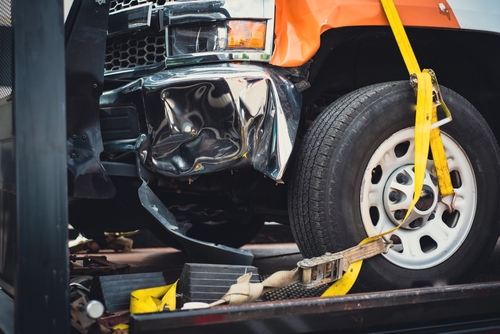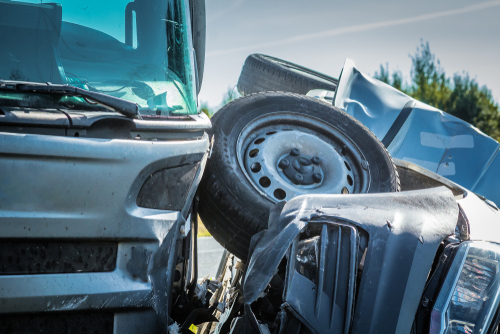Steven A. Bagen | October 1, 2025 | Truck Accidents

If you’ve been in an accident with a logging truck on one of Gainesville’s rural roads, you are likely facing serious injuries and a difficult insurance claim. Gainesville truck accident lawyer these cases are rarely straightforward because they typically involve large commercial policies and multiple responsible parties. Between a recent ten-year period, Florida saw 1,253 crashes involving logging trucks, with a staggering 71% of them happening in rural areas.
Pursuing compensation requires understanding the specific state and federal regulations that govern the logging industry, from load-securing rules to a driver’s legal working hours. The insurance carrier for the trucking company will conduct a thorough investigation, and their goal is to balance paying claims with their business’s financial interests. This means they will look for any evidence to argue you were partly at fault.
We will help you build your own case to counter their arguments. If you have questions about your situation after a logging truck collision, call us for a free case evaluation. Our team at Steven A. Bagen & Associates, P.A. is here to listen. Call us at (800) 800-2575.
Key Takeaways for Gainesville Logging Truck Accident Claims
- Multiple parties may be responsible. Liability in a logging truck crash extends beyond the driver to include the trucking company, cargo loaders, and maintenance providers, which expands the potential sources for compensation.
- Preserving evidence is a priority. The truck’s “black box” data, driver logs, and maintenance records are vital to your claim, and trucking companies may not preserve this information without a formal request from an attorney.
- Regulatory violations are direct evidence of fault. Logging trucks are governed by strict federal and state safety rules, and proving a violation—such as improper load securement or driving over the legal hour limits—strengthens your negligence claim.
What Should You Do Immediately After a Logging Truck Accident?

1. Get Medical Help, Even If You Feel “Okay”
Adrenaline hides pain. That means some injuries won’t show up right away.
Even if you walked away from the crash, go to the ER or urgent care. Let a doctor check for internal injuries, concussions, or soft tissue damage. File a claim for a truck accident these records become the first building blocks of your claim. Without them, the trucking company might later argue you weren’t really hurt.
2. Don’t Talk to the Trucking Company’s Insurance Adjuster Alone
You might get a call within 24 hours. They may sound polite or even helpful.
But remember: their job is to protect their employer’s financial interests. If they ask for a recorded statement, decline until you’ve spoken with a lawyer. Even an honest answer can be taken out of context or used to suggest you were partly at fault.
What sounds like a simple conversation can shrink the value of your claim.
3. Write Down Everything You Can Remember
You don’t need to be perfect. Just be honest and detailed.
- Where were you going?
- What were the road conditions?
- Did you see the truck before the crash?
- Did the logs shift or fall?
- What did you hear, smell, or feel?
4. Save Evidence, Even If You Don’t Know If It’s Useful Yet
If you’re physically able, or someone you trust is nearby:
- Take photos of your injuries.
- Photograph the truck, your car, the road, and the crash scene.
- Get contact info from witnesses.
- Keep damaged clothing, eyeglasses, or personal items.
5. Don’t Post About the Accident Online
Even a short post like “We’re okay, just bruised up” might be used by the defense to downplay your injuries. Insurance investigators routinely check public social media for anything that contradicts a claim.
Keep your recovery private. Share updates directly with friends and family, not the internet.
Why Are Logging Truck Accidents So Different?
The sheer physics of a collision involving a logging truck creates a dangerous situation for other drivers. Truck accident claim process a fully loaded logging truck weighs up to 80,000 pounds, while the average passenger car weighs about 4,000 pounds. This massive disparity in size and weight means that in a collision, the occupants of the smaller vehicle almost always face more severe consequences.
These Are Not Simple “Two-Driver” Accidents
Unlike a typical car accident, cases involving logging truck accidents on rural Gainesville roads are governed by a dense set of rules from the Federal Motor Carrier Safety Administration (FMCSA) and specific Florida statutes. For instance, Florida law dictates that a truck and its cargo cannot exceed certain length limits, and any load projecting more than four feet from the rear must be marked with a red flag and, during specific times, an amber light.
You are also dealing with more than the individual driver. You are likely dealing with the driver’s employer, the logging company, a separate maintenance provider, and their commercial insurance carriers. Each has a financial incentive to shift blame elsewhere. The nature of rural roads around Gainesville and Alachua County, such as two-lane highways with narrow shoulders, limited lighting, and long stretches without traffic signals, reduces reaction times and increases the risk of a catastrophic failure, such as spilled logs or a rollover.
How We Untangle the Details
Our role is to independently investigate every contributing factor. We analyze police reports, but we go much further. We work to determine if a violation of a specific safety rule (like improper cargo securement or a driver working beyond their legal hour limit) contributed to the crash. Proving a direct link between a rule violation and your injuries is a key part of building a strong claim.
Who Could Be Held Responsible for Your Injuries?
One of the first questions people ask is, “Who pays for my medical bills?” The answer is more complicated than just the driver of the truck. The legal concept of negligence means that anyone who had a duty to act with reasonable care, failed to do so, and caused you harm as a result could be held responsible.
In a logging truck case, this creates a “chain of responsibility.” Our investigation looks at the potential liability of every party involved:
- The Truck Driver: Was the driver speeding, distracted, fatigued, or under the influence? Drivers are required to follow strict Hours-of-Service (HOS) rules to prevent tired driving.
- The Trucking Company (Motor Carrier): Did the company pressure drivers to meet unrealistic deadlines? Did they fail to conduct proper background checks, provide adequate training, or supervise their drivers effectively?
- The Logging or Timber Company: In some cases, the company that owns the timber and hired the motor carrier may share some responsibility, particularly if they were involved in overloading the truck.
- The Cargo Loaders: Were the logs properly secured and balanced according to federal and state guidelines? A shifting load leads to a driver losing control, or logs spill onto the roadway, as happened in one tragic Florida accident that killed another driver.
- The Maintenance Provider: Was the truck’s equipment (tires, brakes, lights, and steering) regularly inspected and properly maintained? A mechanical failure resulting from poor maintenance places liability on the company responsible for the truck’s upkeep.
- Government Entities: In some instances, a poorly designed or maintained road could be a contributing factor.
What Evidence Is Used to Build Your Case?

While you focus on your recovery at home, a law firm begins the process of gathering and preserving the evidence needed for your claim. Sue for in a truck accident the trucking company and their insurer start their own investigation immediately, so securing this information promptly is important.
Here is what we typically request and analyze:
The Driver’s Records
- Electronic Logging Device (ELD): This is the modern version of a driver’s logbook. It’s a “black box” that records driving hours, speed, and rest breaks, which shows if a driver was violating HOS regulations.
- Employment File: This includes their driving history, training certifications, and any past violations.
The Truck’s Records
- Maintenance and Inspection Logs: These documents show if the truck was kept in a safe, roadworthy condition as required by law. Gaps in maintenance are a clear sign of negligence.
- “Black Box” Data (ECU): The truck’s onboard computer usually records data from the moments just before a crash, such as speed, braking activity, and steering inputs.
The Load’s Records
- Bills of Lading and Weigh Station Slips: These papers show how much the cargo weighed and where it came from. They are used to prove if a truck was overloaded, which makes it harder to stop and more likely to tip over.
The Crash Scene Evidence
- Photos and Videos: We review any available photos of the scene, vehicle damage, and your injuries.
- Accident Reconstruction: In difficult cases, we may work with engineers who recreate the accident to demonstrate exactly how it happened and who was at fault.
Understanding the Claims Process
First, You File the Claim
The first formal step is to notify the at-fault parties’ insurance companies that you intend to seek compensation for your damages. Truck accident lawyer can help guide you through this process and ensure all required documentation is filed correctly.
Then, the Investigation Begins
An insurance adjuster will be assigned to your case. The adjuster’s role is to investigate the claim on behalf of their employer. They will likely ask you for a recorded statement. We advise speaking with an attorney before providing one. Your words may be misinterpreted or used to argue you were partially responsible for the accident.
Next, Your Damages are Calculated
We will help you document all of your losses, which may include:
- Current and Future Medical Expenses: From the initial emergency room visit to ongoing physical therapy.
- Lost Wages: The income you’ve lost while unable to work.
- Loss of Earning Capacity: If your injuries prevent you from returning to your previous job.
- Pain and Suffering: Compensation for the physical pain and emotional distress caused by the accident.
Finally, Negotiations Take Place
Once your damages are fully calculated, we will send a demand package to the insurance company. Dangers of truck driver fatigue they may accept it, reject it, or make a counter-offer. Our team handles these negotiations for you, and if the insurance company is unwilling to offer a fair settlement, we will explain your option to file a lawsuit.
Frequently Asked Questions About Gainesville Logging Truck Accidents
How long do I have to file a lawsuit for a truck accident in Florida?
In Florida, the statute of limitations for personal injury claims is generally two years from the date of the accident. Speak with an attorney well before this deadline approaches.
What if I was partially at fault for the accident?
Florida follows a “modified comparative negligence” rule. This means you may still recover damages as long as you are not found to be more than 50% at fault. However, your compensation award will be reduced by your percentage of fault.
Do logging trucks have to carry more insurance than regular cars?
Yes. Commercial trucks, including logging trucks, are required by federal law to carry much higher insurance policy limits than passenger vehicles, often ranging from $750,000 to over $1 million, depending on the cargo and routes.
What happens if the logs weren’t secured properly?
Improperly secured cargo that contributes to an accident is a clear sign of negligence. The parties responsible for loading and securing the logs could be held liable for any resulting injuries.
Do I need a lawyer if the insurance company already made me an offer?
Initial settlement offers are typically made before the full extent of your injuries and long-term medical needs are known. An early offer might not account for future surgeries, lost earning potential, or ongoing pain. We recommend having any offer reviewed by a law firm that handles truck accident cases.
Don’t Let the Complicated Nature of Your Case Prevent You from Seeking Fair Compensation

When a trucking company’s insurance adjuster tells you their driver did everything right, it may feel like you have no options. But their story is not the only story. The evidence from the truck’s black box, the driver’s logbooks, and the company’s maintenance records usually reveals something very different.
You have the right to conduct your own investigation. You have the right to demand that all responsible parties are held accountable. Our practice at Steven A. Bagen & Associates, P.A. focuses on these difficult commercial vehicle cases.
Let us help you take the next step. For a free, no-obligation review of your case, call us today at (800) 800-2575.
